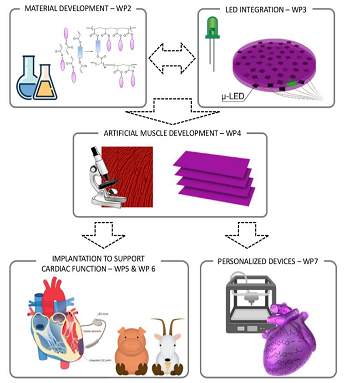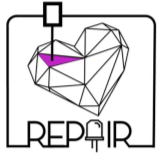Restoring Cardiac Mechanical Function by Polymeric Artificial Muscular Tissue (REPAIR)
Heart failure and cerebral stroke associated to Atrial Fibrillation are some of the most dreadful and frequent diseases. Promising devices to mechanically assist atrial contractile function have been successfully tested in large-animal studies but never reached the clinical use. To solve these clinical challenges is to exploit smart materials to support or restore the cardiac mechanical function. Ideally materials should be able to modulate their strength kinetics and stiffness to fit the features of striated muscles. Temperature, optical and electrical sensitive liquid crystalline polymer, working as artificial muscle, is able to respond to external stimuli in a reversible manner to generate movement or tension.
The REPAIR project is funded by the Horizon 2020 program, with the aims to explore and consolidate a new approach in cardiac contraction assistance in order to put it firmly on the map as a viable paradigm for future technology. The interdisciplinary team involved in will develop prototypes of implantable autonomous devices made by smart materials and interplaying with cardiac rhythm monitor/control systems in-situ paving the way for new biomedical technologies that will lead to enhanced life quality and survival for one of the largest patient group.
TUD ECTM group will develop a mechanical performant and energetically efficient liquid crystalline elastomers (LCEs) that, integrated with μLED array, will result in fundamental biomimetic contractile units to be structured in a suturable, remote-controlled contractile tissue. Will use the LCE-μLED contractile tissue to develop a new generation of contraction assist device and test the effects of their acute implantation in large mammals and explanted hearts.


Project data
| Researchers: | GuoQi Zhang, Zichuan Li |
|---|---|
| Starting date: | June 2020 |
| Closing date: | May 2023 |
| Partners: | Università degli studi di Firenze (UNIFI); Scuola Superiore di Studi Universitari e di Perfezionamento Sant’Anna (SSSA); Universiteit Maastricht (CARIM); Szegedi Tudomanygyetem (USZ); Delft University of Technology (TUD); Consiglio Nazionale delle Ricer |
| Contact: | GuoQi Zhang |